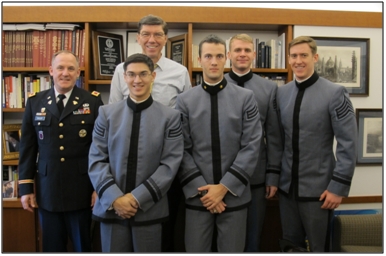What's Happening at EE&CS
Cadets visit IBM T.J. Watson Research Center
Winning Team STITCH briefing at MIT.
Cyber Defense Exercise 2012
On China robotics internship, not all in the lab...
Building a robot controller.
Partnering with Air Force Cadets on a capstone project
Building a Thermometer Sensor in an Information Technology class
All in a good year's work!
All in a good year's work!
|
|
Recent news....
Welcome Cyber Research Center
One of West Point’s oldest research centers was redesignated on Monday, 19 March 2012 as the Cyber Research Center, coinciding with a promotion ceremony for its director, Gregory Conti. In a ceremony led by LTG Rhett Hernandez, Commanding General of U.S. Army Cyber Command/Second Army, Fort Belvoir, VA, Greg Conti was promoted to the rank of Colonel and the Information Technology and Operations Center was redesignated as the Cyber Research Center. LTG Hernandez called Conti “the ultimate cyber warrior” for possessing the four words that title encompasses—elite, trusted, precise and disciplined. “I don’t use those words lightly; our nation will require cyber warriors like Greg. He’s a quiet and competent professional who doesn’t look for credit but looks to solve our toughest problems.”
BG Tim Trainor, Dean of the Academic Board, LTG Rhett Hernandez, COL Greg Conti and COL Barry Shoop officially opened the new Cyber Research Center in Thayer Hall immediately prior the promotion ceremony. The Cyber Research Center traces its lineage back to 1985 when the Artificial Intelligence Center was established at West Point, in large part through the vision and support of GEN Max Thurman. This original research center was intended to investigate how artificial intelligence would benefit the Army. The Cyber Research Center now focuses on cyber warfare, cyber security education, security data visualization, secure and usable interface design and online privacy.
Disruptive Innovation Class Visits Harvard
 COL Barry Shoop and Cadets John Fernandes, Scott Mead, Nicolas Starck-King and Andrew Tindall – all enrolled in the Disruptive and Innovative Technology Ideation Course – traveled to Boston, MA to engage with forward thinking technologists and business leaders. The group had breakfast at the Harvard Faculty Club with Professor Kevin Kit Parker, the Tarr Family Professor of Bioengineering and Applied Physics at the Harvard School of Engineering and Applied Sciences. Next, the group interviewed Professor Clayton Christensen, the Robert and Jane Cizik Professor of Business Administration at the Harvard Business School. The dialog provided the students the opportunity to gain additional insights into the definition of disruptive technology and identify potential emerging disruptive and innovative technologies. Christensen is the architect of and the world’s foremost authority on disruptive innovation and the author of The Innovator’s Dilemma, The Innovator’s Solution, Seeing What’s Next, The Innovator’s Prescription, and Disrupting Class, among others. After the interview the group attended Christensen’s class Building and Sustaining Successful Enterprises.
Class of 2015 Gains Insight into Watson
 Dr. David A. Ferrucci, Principal Investigator of the DeepQA/Watson Project at IBM’s T. J. Watson Research Center delivered the 2012 James C. and Dorothy P. Castle Lecture entitled: Building Watson: An Overview of the DeepQA Project. Dr. Ferrucci spoke to a packed Robinson Auditorium that included the entire USMA Class of 2015, roughly 110 attendees of the Association for Computing Machinery's Special Interest Group for Information Technology Education (SIGITE) Conference and faculty of the Department of Electrical Engineering and Computer Science. The DeepQA project explored how advancing and integrating natural language processing, information retrieval, machine learning, knowledge representation and reasoning and massively parallel computation can greatly advance the science and application of automatic Question Answering. Watson is an artificial intelligence computer system capable of answering questions posed in natural language, developed in IBM's DeepQA project. In 2011, as a test of its abilities, Watson competed on the quiz show Jeopardy!, in the show's only human-versus-machine match-up to date.
|